|
|
|
Sort Order |
|
|
|
Items / Page
|
|
|
|
|
|
|
| Srl | Item |
| 1 |
ID:
182618
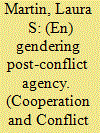

|
|
|
|
|
| Summary/Abstract |
This article explores how female agency and experience manifest in a local Sierra Leonean peacebuilding program known as Fambul Tok. While post-conflict literature, namely transitional justice and peacebuilding, has become more critical in recent years, there is still a tendency to generalize both the ‘local’ and ‘women’. There is, however, much greater scope to delineate how local programs shape and are shaped by women in these settings. While Fambul Tok was, at least theoretically, meant to better align with the needs and priorities of Sierra Leoneans, including women, the empirics suggest that female engagement ultimately results in a wide range of outcomes, which are not necessarily more ‘empowering’, ‘transformative’ or ‘good’ than international programs. Drawing on original empirical data from Fambul Tok, this article highlights the complexity of gendered power relations within these programs and how individual women have multiple, diverse and contested forms of agency and experiences within local settings.
|
|
|
|
|
|
|
|
|
|
|
|
|
|
|
|
| 2 |
ID:
170361
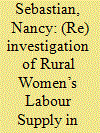

|
|
|
|
|
| Summary/Abstract |
This article examines the role of household poverty in shaping rural female labour supply using the unique panel dataset of India Human Development Survey. The results using Vella and Verbeek’s two-step panel estimation reveal the presence of a backward-sloping labour supply curve for rural women from below poverty line households, and an upward-sloping labour supply for rural women from above poverty line (APL) households. This implies the existence of ‘forced’ or ‘need-based’ participation among poor women and justifies why they work long hours in poorly paid hazardous jobs. The article also finds horizontal labour supply among agriculture wage workers and for Adivasi and Dalit rural women to some extent, reflecting limited job options, and surplus unskilled labour who are unable to demand higher wages for their labour supply. On the other hand, when categorised by occupation type, the downward-sloping labour supply for rural women from APL households indicates the dominance of the income effect over the substitution effect, and the socio-cultural factors that gain strength as income levels increase.
|
|
|
|
|
|
|
|
|
|
|
|
|
|
|
|
| 3 |
ID:
109778
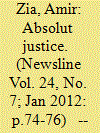

|
|
|
| 4 |
ID:
172711


|
|
|
| 5 |
ID:
179014
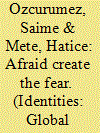

|
|
|
|
|
| Summary/Abstract |
This study investigates the perceptions of the local female population towards displaced Syrians in Turkey. The research is based on the analysis of data from participant observation and discourse analysis of conversations in five ‘gün’ groups, which are informal, social, and fairly regular gatherings of local women, in Mersin in Spring 2018. Five common discursive patterns are identified: stereotyping, biased perceptions, ‘us’ vs. ‘them’, scapegoating, and discrimination. We conclude that local women’s discourses reveal marginalisation and discursive exclusion of displaced Syrians in Turkey, and argue that such othering originates not only from existing cultural differences, language barriers, and lack of trust, but also from lack of sustained social interaction between these groups. Further studies should facilitate both knowledge sharing about the additional vulnerabilities such attitudes create for displaced people and potential paths for meaningful engagement between local community members and forcibly displaced people.
|
|
|
|
|
|
|
|
|
|
|
|
|
|
|
|
| 6 |
ID:
061835
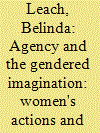

|
|
|
|
|
| Publication |
Jan-Mar 2005.
|
|
|
|
|
|
|
|
|
|
|
|
|
|
|
|
| 7 |
ID:
118294
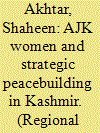

|
|
|
| 8 |
ID:
087689


|
|
|
|
|
| Publication |
2009.
|
| Summary/Abstract |
This article makes a case for rethinking traditional approaches to the study of legislative behaviour on behalf of women by asking (1) not when women make a difference, but how the substantive representation of women occurs; and (2) not what 'women' do, but what specific actors do. The first shift aims to explore the contexts, identities and attitudes that motivate and inform substantive representation. The second seeks to move beyond a focus on female legislators to identify the 'critical actors', male and female, who may attempt to represent women as a group. In so doing, this framework calls attention to how structure and agency interact in the substantive representation of women.
|
|
|
|
|
|
|
|
|
|
|
|
|
|
|
|
| 9 |
ID:
190963
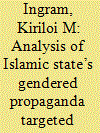

|
|
|
|
|
| Summary/Abstract |
This article analyses Islamic State’s English language propaganda targeting Western women and how that messaging changed as the group shifted from territorial control back into an insurgency. It argues that Islamic State leverages five female representations in its appeals to women in order to construct and project an alternative gender order designed to further the group’s strategic objectives. As those objectives changed, so did the nature of its appeals and the female representations its propaganda emphasised. Based on primary source analysis, it draws on fifteen issues of Dabiq which spans a period of success for the group when it controlled territories and population centres (July 2014 to July 2016) and thirteen issues of Rumiyah which was a period characterised by strategic decline back into an insurgency (September 2016 to September 2017).
|
|
|
|
|
|
|
|
|
|
|
|
|
|
|
|
| 10 |
ID:
090501
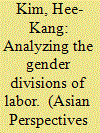

|
|
|
| 11 |
ID:
095713


|
|
|
| 12 |
ID:
166278
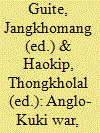

|
|
|
|
|
| Publication |
Oxon, Routledge, 2019.
|
| Description |
xi, 312p.hbk
|
| Standard Number |
9780367137557
|
|
|
|
|
|
|
|
|
|
|
|
Copies: C:1/I:0,R:0,Q:0
Circulation
| Accession# | Call# | Current Location | Status | Policy | Location |
| 059643 | 954.0357/GUI 059643 | Main | On Shelf | General | |
|
|
|
|
| 13 |
ID:
171110
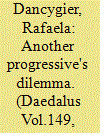

|
|
|
|
|
| Summary/Abstract |
Immigration and the diversity it brings have led to the emergence of the “progressive's dilemma” whereby open societies that take in immigrant outsiders may find it difficult to maintain the solidarity required to sustain the welfare state. In this essay, I address another progressive's dilemma: Focusing on the case of Western Europe, I argue that when open borders give rise to radical-right parties, immigration can inadvertently also endanger progressive achievements in gender equality. Though xenophobic policies frequently constitute their core message and the primary source of their appeal, radical-right parties are also defenders of traditional family values and outspoken critics of measures that promote the economic and political advancement of women. Moreover, the composition of these parties, both in terms of voters and politicians, is disproportionately male. As a result, when radical-right, anti-immigrant parties enter national parliaments, the descriptive and substantive representation of women suffers, sometimes reversing long-held gains in gender equality.
|
|
|
|
|
|
|
|
|
|
|
|
|
|
|
|
| 14 |
ID:
121677
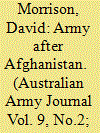

|
|
|
|
|
| Publication |
2012.
|
| Summary/Abstract |
I
t is an honour to address the Sydney Institute. Over more than two decades
Gerard and Anne have cemented the reputation of the Sydney Institute as the
premier forum in this city for the serious discussion of public policy as well as
the arts and culture. Theirs is a considerable achievement, and I am grateful for the
opportunity to deliver my first address to an audience outside Defence as the Chief
of the Army at this Institute. My topic today is the 'Army After Afghanistan.'
|
|
|
|
|
|
|
|
|
|
|
|
|
|
|
|
| 15 |
ID:
140323
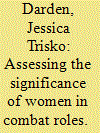

|
|
|
|
|
| Summary/Abstract |
What should we know about the roles of women in armed conflicts? I review the existing literature on women’s roles in regular and irregular conflicts to identify gaps in our understanding of the significance of female combatants. I draw on contemporary and historical cases of women’s combat participation across world regions and, in so doing, I challenge existing assumptions about the limits of women’s participation in armed conflict. Examining women as a group and expecting conflict to affect this group in predictable and easily identifiable ways only reinforces existing assumptions about women and war. To understand the range of motivations underlying women’s decisions to fight or to not fight, we should give greater attention to opportunity structures and other social conditions rather than simply assuming that women have different incentives than men.
|
|
|
|
|
|
|
|
|
|
|
|
|
|
|
|
| 16 |
ID:
106704
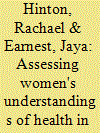

|
|
|
| 17 |
ID:
172236
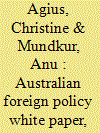

|
|
|
|
|
| Summary/Abstract |
After a 14-year gap, Australia’s 2017 Foreign Policy White Paper advanced a ‘comprehensive framework to advance Australia’s security and prosperity in a contested and competitive world’ (Australian Government 2017a, “2017 Foreign Policy White Paper.” https://www.fpwhitepaper.gov.au/., v). Focused on regional stability, partnerships and global cooperation, it identifies ‘risks and opportunities’ in an altered external environment. In this article, we argue that the neglect of gender and conflict prevention in the White Paper has implications for its stated aspirations with regard to peace and security. This is striking considering the attention that gender—particularly in the context of the Women, Peace and Security (WPS) agenda—has received in other policy areas and documents. Building on feminist security scholarship, conflict prevention approaches, and bringing in civil society voices, we argue that the White Paper contains a gendered, masculinist logic, separating domestic and international issues and paying insufficient attention to the structural and systemic causes of conflict. This article pursues a gender analysis in order to illuminate the gaps present in the White Paper and its limited vision of security and makes the case that conflict prevention from a gender perspective is key to sustainable peace, security and national interests.
|
|
|
|
|
|
|
|
|
|
|
|
|
|
|
|
| 18 |
ID:
113858
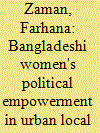

|
|
|
|
|
| Publication |
2012.
|
| Summary/Abstract |
Despite notably increased female involvement in local political bodies in Bangladesh, women continue to face multifarious problems in ongoing processes of shaping political institutions. Stereotypical gendered assumptions about divisions of labour continue to discourage such women from being present and active in the political arena. The article shows that this is not just a matter of Islamic traditionality. There are other factors at work, including lack of sensitivity to such issues among female leaders. Focusing on women ward commissioners, the study reveals specifically that they are frequently unable to show their commitment to the public as they are not assigned independent wards. When women share wards with male ward commissioners, their exposure becomes somehow insignificant to the public. Fieldwork confirms that women ward commissioners firmly believe that discriminatory attitudes of their male counterparts will continue unless they are given separate wards. This supports arguments for continued affirmative action at various levels to address gender balances in South Asian politics.
|
|
|
|
|
|
|
|
|
|
|
|
|
|
|
|
| 19 |
ID:
105902
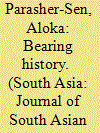

|
|
|
|
|
| Publication |
2011.
|
| Summary/Abstract |
The largely-prescriptive Jaina literary texts contained severe strictures on women that forbade them from undertaking sallekhana- (fasting to death) to attain spiritual liberation. However, fragmentary inscriptions written on stone slabs and pillars found in the Deccan indicate that women did undertake and experience this ritual practice. These records, written at the behest of those who took care of individuals going through sallekhana-, enable us to juxtapose these two sources to argue that there was a dynamic regional religious and social milieu which prevailed over the didactic and normative depictions of an apparently pan-Indian Jaina sensibility. The idea and practice of spiritual liberation during early medieval times in this case study of the Deccan thus illustrates the gender and institutional history of the Jaina faith in its regional and local dimensions.
|
|
|
|
|
|
|
|
|
|
|
|
|
|
|
|
| 20 |
ID:
185581
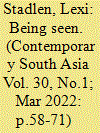

|
|
|
|
|
| Summary/Abstract |
Through an ethnographic focus on a Muslim village in rural West Bengal, this article explores how a group of women have come to defy gendered socio-cultural and locally rooted religious interpretations to become the bureaucratic and political gatekeepers within their community. The wider climate for Muslim men at this moment across India, the characteristics of bureaucratic spaces themselves and the perceived necessity of this kind of work for the most marginal are all identified as facilitating this shift. Yet in addition to these factors, this article will claim that the women themselves are wilfully utilising these encounters in order to become seen by the organs and actors of the local Indian state. It is not simple recognition they are after, nor to be considered as bureaucratic or political insiders, but rather to be seen on their own terms in diverse and context dependant ways that are ultimately of their choosing. As such, this shorkārī kāj or political work has become a central part of their daily lives and identities, to which it is suggested that their attributes and experiences as women may make them particularly well suited.
|
|
|
|
|
|
|
|
|
|
|
|
|
|
|
|
|
|
|
|
|